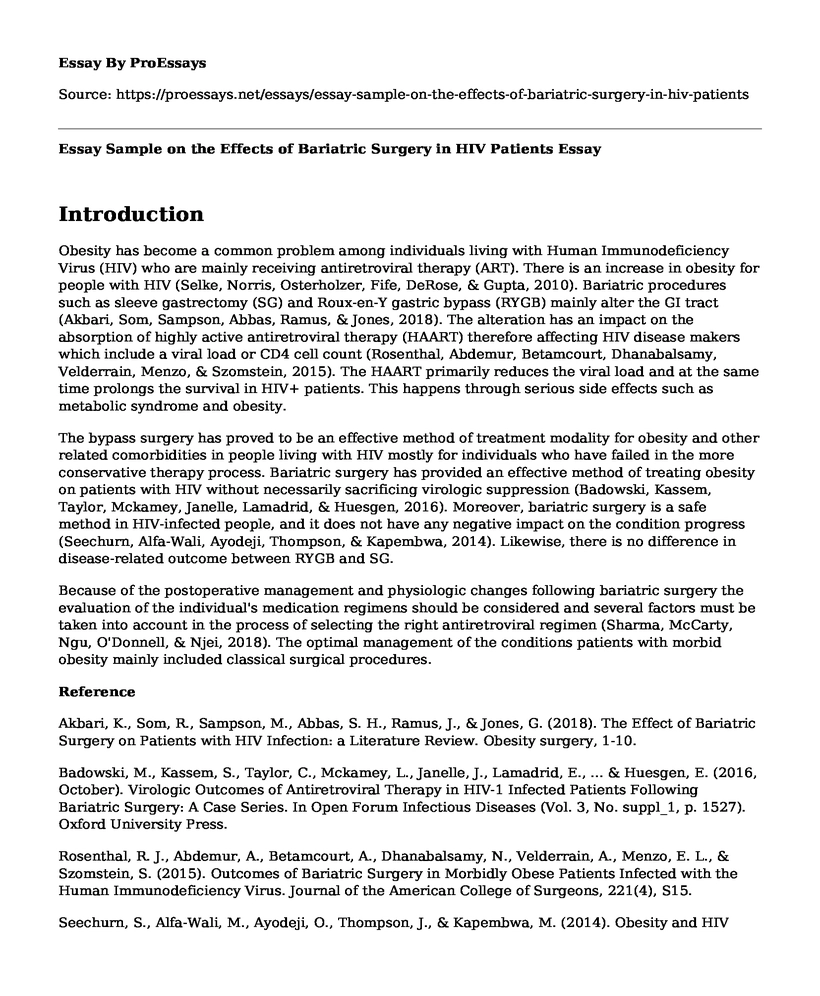Introduction
Obesity has become a common problem among individuals living with Human Immunodeficiency Virus (HIV) who are mainly receiving antiretroviral therapy (ART). There is an increase in obesity for people with HIV (Selke, Norris, Osterholzer, Fife, DeRose, & Gupta, 2010). Bariatric procedures such as sleeve gastrectomy (SG) and Roux-en-Y gastric bypass (RYGB) mainly alter the GI tract (Akbari, Som, Sampson, Abbas, Ramus, & Jones, 2018). The alteration has an impact on the absorption of highly active antiretroviral therapy (HAART) therefore affecting HIV disease makers which include a viral load or CD4 cell count (Rosenthal, Abdemur, Betamcourt, Dhanabalsamy, Velderrain, Menzo, & Szomstein, 2015). The HAART primarily reduces the viral load and at the same time prolongs the survival in HIV+ patients. This happens through serious side effects such as metabolic syndrome and obesity.
The bypass surgery has proved to be an effective method of treatment modality for obesity and other related comorbidities in people living with HIV mostly for individuals who have failed in the more conservative therapy process. Bariatric surgery has provided an effective method of treating obesity on patients with HIV without necessarily sacrificing virologic suppression (Badowski, Kassem, Taylor, Mckamey, Janelle, Lamadrid, & Huesgen, 2016). Moreover, bariatric surgery is a safe method in HIV-infected people, and it does not have any negative impact on the condition progress (Seechurn, Alfa-Wali, Ayodeji, Thompson, & Kapembwa, 2014). Likewise, there is no difference in disease-related outcome between RYGB and SG.
Because of the postoperative management and physiologic changes following bariatric surgery the evaluation of the individual's medication regimens should be considered and several factors must be taken into account in the process of selecting the right antiretroviral regimen (Sharma, McCarty, Ngu, O'Donnell, & Njei, 2018). The optimal management of the conditions patients with morbid obesity mainly included classical surgical procedures.
Reference
Akbari, K., Som, R., Sampson, M., Abbas, S. H., Ramus, J., & Jones, G. (2018). The Effect of Bariatric Surgery on Patients with HIV Infection: a Literature Review. Obesity surgery, 1-10.
Badowski, M., Kassem, S., Taylor, C., Mckamey, L., Janelle, J., Lamadrid, E., ... & Huesgen, E. (2016, October). Virologic Outcomes of Antiretroviral Therapy in HIV-1 Infected Patients Following Bariatric Surgery: A Case Series. In Open Forum Infectious Diseases (Vol. 3, No. suppl_1, p. 1527). Oxford University Press.
Rosenthal, R. J., Abdemur, A., Betamcourt, A., Dhanabalsamy, N., Velderrain, A., Menzo, E. L., & Szomstein, S. (2015). Outcomes of Bariatric Surgery in Morbidly Obese Patients Infected with the Human Immunodeficiency Virus. Journal of the American College of Surgeons, 221(4), S15.
Seechurn, S., Alfa-Wali, M., Ayodeji, O., Thompson, J., & Kapembwa, M. (2014). Obesity and HIV infection-is there a role for bariatric surgery in treatment?. Journal of AIDS and Clinical Research, 5(12).
Selke, H., Norris, S., Osterholzer, D., Fife, K. H., DeRose, B., & Gupta, S. K. (2010). Bariatric surgery outcomes in HIV-infected subjects: a case series. AIDS patient care and STDs, 24(9), 545-550.
Sharma, P., McCarty, T. R., Ngu, J. N., O'Donnell, M., & Njei, B. (2018). Impact of bariatric surgery in patients with HIV infection: a nationwide inpatient sample analysis, 2004-2014. Aids, 32(14), 1959-1965.
Cite this page
Essay Sample on the Effects of Bariatric Surgery in HIV Patients. (2022, Nov 29). Retrieved from https://proessays.net/essays/essay-sample-on-the-effects-of-bariatric-surgery-in-hiv-patients
If you are the original author of this essay and no longer wish to have it published on the ProEssays website, please click below to request its removal:
- Questions and Answers on Impacts that Solvents and Noise Have on Hearing
- Achievements in RN to BSN Program Essay
- Paper Example on Evidence-Based Health Care
- Amoxicillin Paper Example
- Essay Sample on Authenticating Nursing Information Online: A Research Guide.
- Essay Sample on Steve's Informed Consent: Understanding Complexity and Ethics
- COVID-19: The Impact on Tourism & Travel Industry - Free Paper Example







